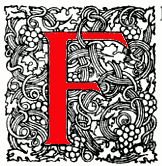This passage appears in Housman's autobiography, The Unexpected Years. Housman created the decorated initial for his The Field of Clover (1898) — George P. Landow.

or the second time only, I met Oscar Wilde, then in forlorn exile;. . . from the conversation which took place as we lunched with a party of friends I obtained the material for the dramatic dialogue called Echo de Paris which I wrote and published twenty-four years later, and from the preface to which I may here give the impression made on me:
My memory of him on that occasion inclines me to believe that those are right who maintain that as a personality he was more considerable than as a writer. The brilliance of conversation is doubtfully reproduced in the medium of cold print, and I may have wholly failed to convey the peculiar arresting quality of what by word of mouth sounded so well. But the impression left upon me from that occasion is that Oscar Wilde was incomparably the most accomplished talker I have ever met. The smoothflowing utterance, sedate and self-possessed, oracular in tone, whimsical in substance, carried on without halt or hesitation, or change of word, with the quiet zest of a man perfect at the game, and conscious that, for the moment at least, he was back at his old form again: this, combined with the pleasure, infectious to his listeners, of finding himself once more in a group of friends whose view of his downfall was not the world's view, made memorable to others besides myself a reunion more happily prolonged than this selected portion of it would indicate.
But what I admired most was the quiet uncomplaining courage with which he accepted an ostracism against which, in his lifetime, there could be no appeal. To a man of his habits and temperament conscious that the incen tive to produce was gone with the popular applause which had been its recurrent stimulus the outlook was utterly dark: life had already become a tomb. And it is as a "Monologue d outre tombe" that I recall his conversation on that day: and whether it had any intrinsic value or no, it was at least a wonderful expression of that gift which he had for charming himself by charming others.
Among the many things he touched on that day (of which only a few disjointed sentences now remain to me) one note of enthusiasm I have always remembered, coming as it did strangely from him, with his elaborate and artificial code of values, based mainly not on beauty of human character, but on beauty of form when, with a sudden warmth of word and tone, he praised Mrs. Gladstone for her greatness and gentleness of heart: "her beautiful and perfect charity" I think was the phrase he used: "But then, she was always like that."
None of us knew her, but from that day on, the warmth and humility of his praise left an impression upon my mind which a reading of her life only two years ago came to confirm. Perhaps I like to think that it was possible an expression of her "beautiful and perfect charity" had come to him personally, so making her stand differently in his eyes from the rest of the world. [182-83]
Bibliography
Housman, Laurence. The Unexpected Years. London: Jonathan Cape, 1936.
Last modified 19 November 2012